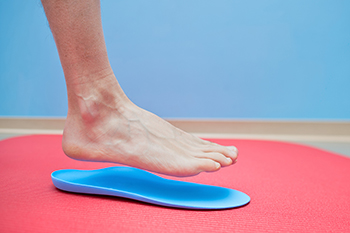

Orthotics are defined as devices that are inserted in the shoes designed to help to correct foot abnormalities. Custom-made orthotics are tailored to a patient's specific needs, and can be effective in providing comfort as daily activities are completed. People who have flat feet or high arches may be candidates for orthotics, in addition to patients who have hammertoe or bunions. Orthotics can alter the angles of how the foot strikes the ground or absorbs shock, and may help to improve balance. Podiatrists may consider orthotics to be a viable option in correcting foot and ankle conditions before considering foot surgery. It is important for people who are diabetic to ensure their orthotics fit perfectly, possibly helping to prevent additional unwanted foot issues. If you would like to know if wearing orthotics is an option for you, it is suggested that you consult with a podiatrist who can guide you toward making the right decision.
If you are having discomfort in your feet and would like to try orthotics, contact Massimo Pietrantoni, DPM from Rochester Podiatry, LLP. Our doctor can provide the care you need to keep you pain-free and on your feet.
What Are Orthotics?
Orthotics are inserts you can place into your shoes to help with a variety of foot problems such as flat feet or foot pain. Orthotics provide relief and comfort for minor foot and heel pain but can’t correct serious biomechanical problems in your feet.
Over-the-Counter Inserts
Orthotics come in a wide variety of over-the-counter inserts that are used to treat foot pain, heel pain, and minor problems. For example, arch supports can be inserted into your shoes to help correct overarched or flat feet, while gel insoles are often used because they provide comfort and relief from foot and heel pain by alleviating pressure.
Prescription Orthotics
If over-the-counter inserts don’t work for you or if you have a more severe foot concern, it is possible to have your podiatrist prescribe custom orthotics. These high-quality inserts are designed to treat problems such as abnormal motion, plantar fasciitis, and severe forms of heel pain. They can even be used to help patients suffering from diabetes by treating foot ulcers and painful calluses and are usually molded to your feet individually, which allows them to provide full support and comfort.
If you are experiencing minor to severe foot or heel pain, it’s recommended to speak with your podiatrist about the possibilities of using orthotics. A podiatrist can determine which type of orthotic is right for you and allow you to take the first steps towards being pain-free.
If you have any questions please contact one of our offices located in Brighton and Greece of Rochester, NY . We offer the newest diagnostic and treatment technologies for all your foot and ankle needs.